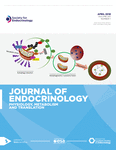Dissecting thyroid hormone transport and metabolism in dendritic cells
- Nicolás Gigena1,
- Vanina A Alamino1,
- María del Mar Montesinos1,
- Magalí Nazar1,
- Ruy A Louzada2,
- Simone M Wajner3,
- Ana L Maia3,
- Ana M Masini-Repiso1,
- Denise P Carvalho2,
- Graciela A Cremaschi4 and
- Claudia G Pellizas1⇑
- 1Centro de Investigaciones en Bioquímica Clínica e Inmunología (CIBICI-CONICET), Facultad de Ciencias Químicas, Universidad Nacional de Córdoba, Córdoba, Argentina
- 2Instituto de Biofísica Carlos Chagas Filho, Universidade Federal do Rio de Janeiro, Centro de Ciências da Saúde, Rio de Janeiro, Brazil
- 3Thyroid Unit, Endocrinology Division, Hospital de Clínicas de Porto Alegre, Universidade Federal do Rio Grande do Sul, Porto Alegre, Brazil
- 4Laboratorio de Neuroinmunomodulación y Oncología Molecular, Instituto de Investigaciones Biomédicas (BIOMED-CONICET), Universidad Católica Argentina, Ciudad Autónoma de Buenos Aires, Argentina
- Correspondence should be addressed to C G Pellizas; Email: claudia{at}fcq.unc.edu.ar
Abstract
We reported thyroid hormone (TH) receptor expression in murine dendritic cells (DCs) and 3,5,3′-triiodothyronine (T3)-dependent stimulation of DC maturation and ability to develop a Th1-type adaptive response. Moreover, an increased DC capacity to promote antigen-specific cytotoxic T-cell activity, exploited in a DC-based antitumor vaccination protocol, was revealed. However, putative effects of the main circulating TH, l-thyroxine (T4) and the mechanisms of TH transport and metabolism at DC level, crucial events for TH action at target cell level, were not known. Herein, we show that T4 did not reproduce those registered T3-dependent effects, finding that may reflect a homoeostatic control to prevent unspecific systemic activation of DCs. Besides, DCs express MCT10 and LAT2 TH transporters, and these cells mainly transport T3 with a favored involvement of MCT10 as its inhibition almost prevented T3 saturable uptake mechanism and reduced T3-induced IL-12 production. In turn, DCs express iodothyronine deiodonases type 2 and 3 (D2, D3) and exhibit both enzymatic activities with a prevalence towards TH inactivation. Moreover, T3 increased MCT10 and LAT2 expression and T3 efflux from DCs but not T3 uptake, whereas it induced a robust induction of D3 with a parallel slight reduction in D2. These findings disclose pivotal events involved in the mechanism of action of THs on DCs, providing valuable tools for manipulating the immunogenic potential of these cells. Furthermore, they broaden the knowledge of the TH mechanism of action at the immune system network.
- thyroid hormones (THs)
- triiodothyronine (T3)
- TH mechanism of action
- dendritic cells (DCs)
- TH transport
- TH metabolism
- Received 6 December 2016
- Accepted 15 December 2016
- Made available online as an Accepted Preprint 4 January 2017
- © 2017 Society for Endocrinology











